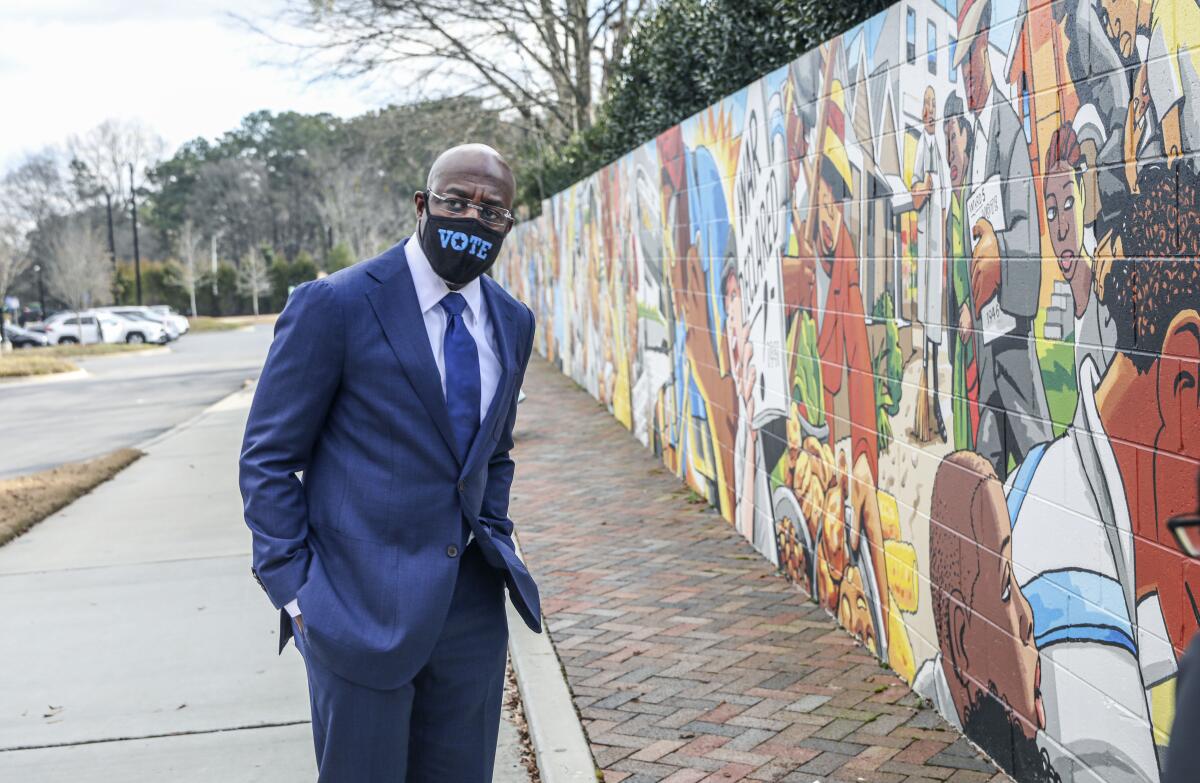Democrats close in on Senate control with Warnock win and Ossoff lead

- Share via
ATLANTA — Democrats were within reach of winning control of the Senate on Wednesday as they celebrated the victory of the Rev. Raphael Warnock in one of Georgia’s two runoff races and waited for final votes to be counted in the other.
The contest between Democrat Jon Ossoff and Republican David Perdue, whose Senate term expired Sunday, remained too close to call. But Ossoff’s razor-thin lead widened overnight to more than 16,000 votes by Wednesday morning, with about 98% of the vote counted — a bigger gap than that between President-elect Joe Biden, who won Georgia, and President Trump in November’s election.
Most of the remaining uncounted votes in the state were from the Atlanta and Savannah regions, areas where Democrats have piled up significant majorities.
A key question is whether the Ossoff-Perdue race will be decided by a margin wide enough to avoid a recount. Under Georgia law, a candidate can request a recount if the margin is less than half a percentage point.
Victory for both Warnock and Ossoff would be a major boon for Biden and increase his chances of enacting his legislative agenda.
Warnock’s win makes him the first Black senator from Georgia. CNN, MSNBC and the Associated Press called the election for Warnock early Wednesday after he amassed a lead of more than 40,000 votes over his opponent, Sen. Kelly Loeffler.
“Georgia, I am honored by the faith you have shown in me,” Warnock said in a video statement. “I am going to the Senate to work for all of Georgia.”
Noting the historic nature of his victory, Warnock talked of his mother casting a vote for him.
“The other day, because this is America, the 82-year-old hands that used to pick somebody else’s cotton went to the polls and picked her youngest son to be a United States senator,” he said.
Loeffler did not concede, telling supporters she believed she had “a path to victory.”
“This is a game of inches; we are going to win this election and we are going to save this country,” she said.
Ossoff‘s campaign issued a statement early Wednesday saying that “when all the votes are counted, we fully expect that Jon Ossoff will have won.”
Already, Republicans were battling over blame for the apparent loss in races they believed they would win, with many pointing fingers at President Trump for his divisive attacks on other Republican elected officials.
“Everything he has done made it less likely that we would win,” one longtime Republican strategist said Tuesday night as the returns came in.
“Donald Trump doesn’t want Republicans to win,” because when they do, “it makes it look like he is the only Republican in the country who cannot win,” the strategist added, speaking anonymously to avoid retribution from the president.
A final outcome may not be known until overseas and military ballots are counted. By law, overseas and military ballots have until Friday to arrive at election offices.
Republicans only have to win one of the two runoff seats to maintain majority control of the Senate. If Democrats win both races, the chamber will be tied 50 to 50, with Vice President-elect Kamala Harris holding the tiebreaking vote to give Democrats control, which would allow them to approve major parts of Biden’s agenda, as well as his nominees.
Democrats outperformed the GOP among the nearly 3.1 million Georgians who voted early, and as the votes came in, Republicans appeared to be falling short of their hopes of making up that ground with a strong election day showing.
Turnout was high in key Democratic areas, but appeared to be less so in some of the most conservative areas of the state, such as northwest Georgia, where Trump campaigned Sunday.
Republicans have held both of Georgia’s Senate seats for 15 years, but the state has become increasingly competitive, and Biden defeated Trump here by a narrow margin — just under 12,000 votes — in November.
Going into the race, there was just one thing everyone seemed to agree on: The results would be close.
Jack Kingston, a former Republican congressman from Georgia’s 1st District, credited Democrats’ massive get-out-the-vote machine. Republicans sent out fliers to potential voters, he said, while Democrats sent out handwritten letters. Democrats also mailed voters forms to request absentee ballots and offered them rides to the polls.
“The Democrats have worked their tails off,” he said.
Among the most promising signs for Democrats: Their base of Black voters showed up in force early, representing 31% of the early vote as opposed to 28% in the general election. More than 123,000 of those who voted early after skipping November’s election were Black, Latino and Asian Americans.
Republicans banked on strong turnout in rural counties to overtake the early Democratic lead. On Tuesday, Loeffler and Perdue sent out a joint statement urging their supporters to go to the polls. The two said they were “encouraged” by reports of high voter turnout in traditionally GOP territory in northern Georgia, but such last-minute appeals are not often a sign of confidence.
The two Republicans warned it would be a “very close election” that “could come down to the difference of just a few votes in a few precincts.”
“This generational election will be decided by the votes cast in the next few hours — no one should be sitting on the sidelines. Go vote!” they wrote.
With control of the Senate at stake, Trump and Biden to campaign in Georgia, capping a campaign that has been shadowed by the president and COVID-19.
The Republican campaign may have been hindered by an extraordinary level of intraparty fighting as Trump campaigned to reverse Biden’s victory in Georgia and attacked GOP officials for failing to do more to support his unsubstantiated claims of voting fraud in the state.
Many Republicans had worried for weeks that Trump’s attacks on the November election would discourage supporters from turning out.
“Really, these last two months have just been painful,” said Allen Peake, a former Georgia state representative from Macon.
“To watch the president go down this rabbit hole, I’m like every other Republican; I cringe, I wonder what he’s going to say, what he’s going to do, what other embarrassment he’s going to bring upon himself, the party and the country.”
With the stakes so high, the two sides spent more than half a billion dollars on the two-month runoff campaign, and each race broke the record for spending in a Senate race. The Democratic candidates raised considerably more money than the Republican incumbents, but spending by outside groups — mostly four super PACs affiliated with Senate Majority Leader Mitch McConnell (R-Ky.) — gave the Republicans an overall advantage.
There were few snafus Tuesday as hundreds of thousands of voters across the state poured into polling stations on a chilly but bright, sunny day to cast their ballots.
Wait times across the state averaged about one minute, according to the secretary of state’s office.
Republicans had been favored early on to win the runoffs, which were needed because no candidate in either race got more than 50% of the vote in November. In past runoffs, GOP voters have turned out in more force, and the Republican candidates also performed slightly better than Democrats in the general election.
In November, Perdue received about 80,000 more votes than Ossoff, but fell short of the 50% threshold needed to win. In the other race, a special election that featured multiple candidates from each party, Warnock finished ahead of Loeffler with about a third of the vote, but Republican candidates overall narrowly won more votes than Democrats.
The race was made much more competitive as Democrats ran a well-financed, nationally driven campaign, and grass-roots voter mobilization groups fanned out across the state to ramp up early voter turnout across Atlanta’s urban and suburban counties.
With much at stake — Georgia’s two elections Jan. 5 will decide which party runs the Senate — Californians are volunteering by making calls, sending texts and sometimes even traveling across the country.
For Democrats, winning both seats would allow them to avert gridlock in Congress and give Biden a chance to enact his legislative agenda. The election is also a test of whether Biden’s victory against Trump here was just a one-off or represents a significant realignment of political power in this Southern battleground state.
As Stacey Abrams, the Democrats’ former candidate for governor, put it Monday at a rally: “Georgia, we have a chance tomorrow to prove what happened in November wasn’t a fluke, but the future.”
For weeks, Trump and the Republican candidates have warned that if the Democrats win both Senate seats, the party would have full control of both the White House and Congress, giving Biden a free hand.
In reality, a 50-50 Senate with Harris breaking ties would still leave Biden significantly constrained, able to move no further than the most moderate Democrat would allow. Sen. Joe Manchin III of West Virginia, for example, has already publicly said he would block some goals sought by progressive Democrats, such as eliminating filibusters on legislation in the Senate.
“The control there is going to really be in the hands of the moderates,” said Alan Abramowitz, a professor of political science at Emory University. “Several of these moderate Democrats from several swing states or red states are going to have a lot to say about what can be passed. … Republicans’ warnings about radical socialism are complete nonsense.”
Still, having a majority in the Senate — even by the narrowest of margins — can make a huge difference.
By tradition, the majority leader sets the Senate’s agenda — a power that has expanded greatly in recent decades. The current leader, McConnell, has used that power to bottle up House-passed bills he opposes, and would no doubt continue that despite having generally friendly relations with Biden.
Democrats’ bills on voting rights, government ethics and imposing limits on partisan gerrymandering of congressional districts are among those that McConnell likely would block but which Senate Democratic Leader Charles E. Schumer of New York could be expected to advance if the Democrats win control.
Control of the Senate would also give Biden a clear path to filling vacancies in federal courts. McConnell blocked Senate confirmation of many judges President Obama chose during his last two years in office. That created a large backlog that played a big role in Trump’s ability to appoint more than 220 federal judges, shifting the judiciary to the right. Biden could shift it back again, in part because a large number of older federal judges, mostly appointed by President Clinton, have contemplated taking semi-retired senior status once Biden takes office. But if Republicans keep control of the Senate, McConnell could block any new appointments.
An even more immediate impact would probably come with Biden’s Cabinet selections. With a Democratic Senate, few if any of Biden’s picks would appear endangered. If Republicans keep the majority, several face tough opposition, including California Atty. Gen. Xavier Becerra, Biden’s choice for Health and Human Services secretary, and Neera Tanden, his choice to head the Office of Management and Budget.
Whatever party ultimately wins Tuesday’s runoffs, Georgia is likely to keep its battleground status.
“The new normal is that Georgia is more electorally competitive,” said Andra Gillespie, an associate professor of political science at Emory.
“We are entering an era where Democrats can now have a reasonable expectation that, if they work hard to campaign, they can win elections,” she said. “But that doesn’t guarantee them victory.”
Times staff writer Janet Hook contributed to this report.
More to Read
Get the L.A. Times Politics newsletter
Deeply reported insights into legislation, politics and policy from Sacramento, Washington and beyond. In your inbox three times per week.
You may occasionally receive promotional content from the Los Angeles Times.













